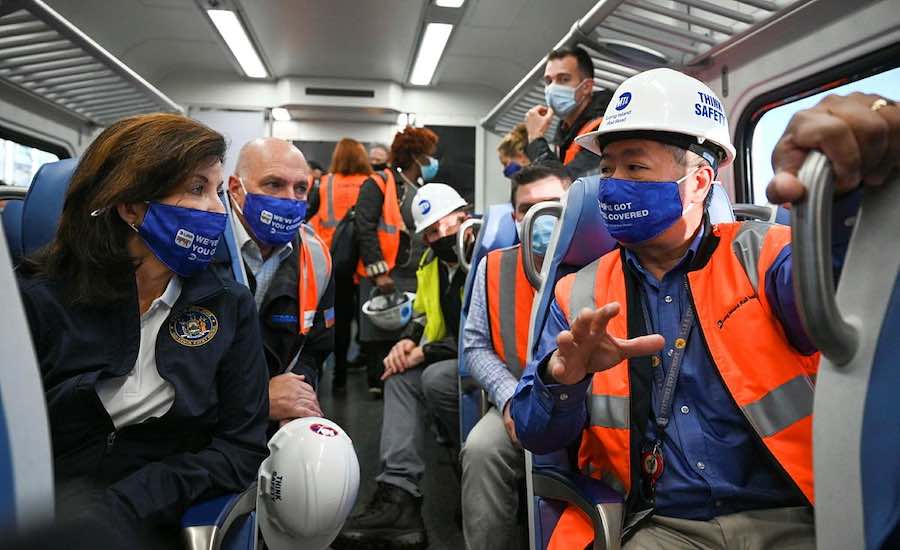Executive News
Veteran NY Exec To Run Massachusetts' Troubled Transit Agency
Phillip Eng takes reins at MBTA after series of high-profile mishaps

Former LIRR President Phillip Eng (right) speaks to New York Gov. Kathy Hochul. Eng was recently named the general manager for the Massachusetts Bay Transportation Authority.
Photo: Metropolitan Transportation Authority via Wikimedia Commons
The appointment of a new general manager of the Massachusetts Bay Transportation Authority has the potential to bring badly needed stability to the troubled transit agency, which plays a key role in both the local construction and real estate sectors, industry executives say.
Veteran transportation executive Phillip Eng will take the reins at the agency, known as the T, after being named to the job by Gov. Maura Healey last week.
An engineer by training, Eng spent the last few years running the Long Island Rail Road, billed as the busiest commuter rail system in the country. Phillip Eng is elevated to president of New York state’s Long Island Rail Road, which parent agency Metropolitan Transportation Authority says is the busiest U.S. commuter railroad. He had been parent agency Metropolitan Transportation Authority chief operating officer and also was acting president of New York City Transit.
Eng, who also had been executive deputy commissioner of the New York Dept. of Transportation, began implementing a $20-milllion performance improvement plan at LIRR. He oversaw a dramatic improvement, elevating its performance to the best on record after a period in which the system struggled to make the trains run on time.
Boston area construction and real estate leaders hope Eng can get the beleaguered T back on track as well, with the transit authority’s woes having a negative impact on everything from plans for new development projects near train stops to efforts by contractors to pursue potential bidding opportunities on agency projects.
New construction ahead
New leadership and stability at the T is crucial for the construction industry across Greater Boston, with the transit authority a major source of work. Appointment of a new GM will also enable it to keep moving forward on an array of major capital improvement projects, said Richard Dimino, president and CEO of A Better City.
The agency currently is overseeing more than $1 billion in repair work, with other big projects looming such as electrification of the system.
“I think they made an excellent choice in terms of the kind of experience and knowledge and leadership style [Eng] has based on my reading of all his resume material and also checking with my colleagues from New York,” Dimino said.
John Ferrante, CEO of the state chapter of the Associated General Contractors, said his members are hoping that new leadership will potentially open some new bidding opportunities, calling it a “fresh start.”
In particular, the T is slated to build a series of maintenance and depot complexes for a new fleet of electric buses it eventually plans to roll out.
But work on the first project, in Quincy, has run into trouble, highlighting an agency need for contractors with experience in vertical construction, not just in track repair and other associated work.
“That was a little bit of a wakeup call for the MBTA,” Ferrante said, which "needed to do a better job of engaging with contractors on what is the most efficient way of bringing [projects] in on time and on budget.”
He said the agency has "pulled a pretty good group of folks over there [who] are trying to improve the construction management process.”
T playing bigger role in development
Proper functioning of the T has always been important to the real estate industry. But the transit agency’s role has gained added importance in recent years, with a state housing initiative and the office market upheaval in the wake of the pandemic
State lawmakers rolled out new rules in 2021 aimed at spurring new development near system subway and train stops, better known as the MBTA Communities Act. But issues with the T and its reliability have raised concerns among developers and local officials eyeing potential transit-oriented development projects.
Not only is a functioning T key in attracting renters and condo buyers to these projects, it is also crucial for easing concerns among local officials that proposals for new apartment and condo buildings will end up adding more traffic to local streets.
“We are very excited to hear that the position has been filled,” said Tamara Small, CEO of NAIOP Massachusetts, which represents the real estate and development industry. “Certainly based on what we have heard about him, he is a proven leader with the skills that the MBTA desperately needs."
She adds that transit linked development "relies on a functioning transit system. It’s a tough sell if you don’t have that.”
Efforts to draw workers back to offices and revive downtown Boston may also hinge to some extent on whether Eng can get the beleaguered transit agency back on track. This also is critical to the Boston area’s booming life sciences and lab sector, which is heavily reliant on the MBTA as well, said Greg Vasil, CEO of the Greater Boston Real Estate Board.
“Our members are definitely concerned about the state of public transportation in the CommonWealth,” he said. “It is our people mover.”




